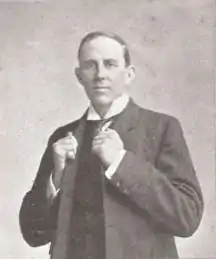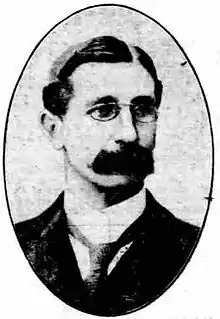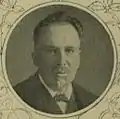Osgoldcross (UK Parliament constituency)
Osgoldcross was a parliamentary constituency in the Osgoldcross Rural District of West Yorkshire. It returned one Member of Parliament (MP) to the House of Commons of the Parliament of the United Kingdom, elected by the first past the post system.
| Osgoldcross | |
|---|---|
| Former County constituency for the House of Commons | |
| 1885–1918 | |
| Seats | one |
| Created from | Eastern West Riding of Yorkshire |
| Replaced by | Barkston Ash, Hemsworth and Pontefract |
History
The constituency was created when the two-member Eastern West Riding of Yorkshire was divided by the Redistribution of Seats Act 1885 for the 1885 general election. It was abolished for the 1918 general election.
Boundaries
The Redistribution of Seats Act 1885 provided that the constituency should consist of
- the municipal borough of Pontefract,
- the wapentake of Osgoldcross,
- the Parishes in the Sessional Division of Upper Barkston Ash of Brotherton, Fairburn, Ledsham and Ledstone, and
- the Parishes in the Sessional Division of Skyrack of Allerton Bywater and Kippax.[1]
Members of Parliament
| Election | Member | Party | |
|---|---|---|---|
| 1885 | Sir John Ramsden, Bt | Independent Liberal | |
| 1886 | Liberal Unionist | ||
| 1886 | Sir John Austin, Bt | Liberal | |
| 1899 | Independent Liberal | ||
| 1906 | Sir Joseph Compton-Rickett | Liberal | |
| 1918 | constituency abolished | ||
Elections
Elections in the 1880s
| Party | Candidate | Votes | % | ±% | |
|---|---|---|---|---|---|
| Liberal | John Ramsden | 5,153 | 62.8 | ||
| Conservative | Reginald Hardy[3] | 3,053 | 37.2 | ||
| Majority | 2,100 | 25.6 | |||
| Turnout | 8,206 | 79.5 | |||
| Registered electors | 10,322 | ||||
| Liberal win (new seat) | |||||

| Party | Candidate | Votes | % | ±% | |
|---|---|---|---|---|---|
| Liberal | John Austin | 4,008 | 57.1 | -5.7 | |
| Liberal Unionist | John Ramsden | 3,010 | 42.9 | +5.7 | |
| Majority | 998 | 14.2 | -11.4 | ||
| Turnout | 7,018 | 68.0 | −11.5 | ||
| Registered electors | 10,322 | ||||
| Liberal hold | Swing | −5.7 | |||
Elections in the 1890s
| Party | Candidate | Votes | % | ±% | |
|---|---|---|---|---|---|
| Liberal | John Austin | 5,160 | 61.1 | +4.0 | |
| Conservative | Charles Brook Dobson[6] | 3,284 | 38.9 | -4.0 | |
| Majority | 1,876 | 22.2 | +8.0 | ||
| Turnout | 8,444 | 66.9 | -1.1 | ||
| Registered electors | 12,615 | ||||
| Liberal hold | Swing | +4.0 | |||
| Party | Candidate | Votes | % | ±% | |
|---|---|---|---|---|---|
| Liberal | John Austin | 5,119 | 55.8 | -5.3 | |
| Conservative | John Harling | 4,054 | 44.2 | +5.3 | |
| Majority | 1,065 | 11.6 | -10.6 | ||
| Turnout | 9,173 | 70.1 | +3.2 | ||
| Registered electors | 13,083 | ||||
| Liberal hold | Swing | -5.3 | |||
Austin left the Liberal Party and sought re-election as an independent candidate.

| Party | Candidate | Votes | % | ±% | |
|---|---|---|---|---|---|
| Independent Liberal | John Austin | 5,818 | 66.8 | New | |
| Liberal | Charles Henry Roberts | 2,893 | 33.2 | −22.6 | |
| Majority | 2,925 | 33.6 | N/A | ||
| Turnout | 8,711 | 62.2 | −7.9 | ||
| Registered electors | 14,009 | ||||
| Independent Liberal gain from Liberal | Swing | N/A | |||
Elections in the 1900s

| Party | Candidate | Votes | % | ±% | |
|---|---|---|---|---|---|
| Independent Liberal | John Austin | 5,609 | 65.0 | N/A | |
| Liberal | Vickerman Rutherford | 3,025 | 35.0 | −20.8 | |
| Majority | 2,584 | 30.0 | N/A | ||
| Turnout | 8,634 | 58.8 | −11.3 | ||
| Registered electors | 14,689 | ||||
| Independent Liberal gain from Liberal | Swing | N/A | |||

| Party | Candidate | Votes | % | ±% | |
|---|---|---|---|---|---|
| Liberal | Joseph Compton-Rickett | 8,482 | 66.1 | +31.1 | |
| Conservative | Granville Wheler | 4,358 | 33.9 | New | |
| Majority | 4,124 | 32.2 | N/A | ||
| Turnout | 12,840 | 75.8 | +17.0 | ||
| Registered electors | 16,935 | ||||
| Liberal gain from Independent Liberal | Swing | N/A | |||
Elections in the 1910s
| Party | Candidate | Votes | % | ±% | |
|---|---|---|---|---|---|
| Liberal | Joseph Compton-Rickett | 9,517 | 66.3 | +0.2 | |
| Conservative | Gerald Hargreaves | 4,840 | 33.7 | −0.2 | |
| Majority | 4,677 | 32.6 | +0.4 | ||
| Turnout | 14,357 | 78.5 | +2.7 | ||
| Registered electors | 18,286 | ||||
| Liberal hold | Swing | +0.2 | |||
| Party | Candidate | Votes | % | ±% | |
|---|---|---|---|---|---|
| Liberal | Joseph Compton-Rickett | 8,518 | 66.2 | -0.1 | |
| Conservative | Malcolm Campbell-Johnston | 4,347 | 33.8 | +0.1 | |
| Majority | 4,171 | 32.4 | -0.2 | ||
| Turnout | 12,865 | 70.4 | −8.1 | ||
| Registered electors | 18,286 | ||||
| Liberal hold | Swing | -0.1 | |||
General Election 1914–15:
Another General Election was required to take place before the end of 1915. The political parties had been making preparations for an election to take place and by the July 1914, the following candidates had been selected;
- Liberal: Joseph Compton-Rickett
- Unionist:
- Labour: John Potts[13]
See also
References
- Redistribution of Seats Act 1885
- British parliamentary election results, 1885-1918 (Craig)
- "The Elections". Edinburgh Evening News. 30 November 1885. p. 3. Retrieved 6 December 2017 – via British Newspaper Archive.
- British parliamentary election results, 1885-1918 (Craig)
- British parliamentary election results, 1885-1918 (Craig)
- "Administrative papers rel to the candidate of Charles Brook Dobson in the Osgoldcross division". The National Archives. Retrieved 12 November 2017.
- British parliamentary election results, 1885-1918 (Craig)
- British parliamentary election results, 1885-1918 (Craig)
- British parliamentary election results, 1885-1918 (Craig)
- British parliamentary election results, 1885-1918 (Craig)
- British parliamentary election results, 1885-1918 (Craig)
- British parliamentary election results, 1885-1918 (Craig)
- The miners and British politics 1906-1914